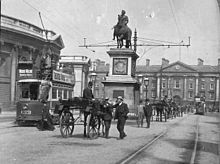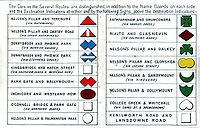- Dublin United Transport Company
-
The Dublin United Transport Company (DUTC) operated trams and buses in Dublin, Ireland until 1945. Following legislation in the Oireachtas (Transport Act 1944), the DUTC and the Great Southern Railways (Ireland) were vested in the newly formed Coras Iompair Éireann in 1945.[1]
Contents
History
Formation
The DUTC was formed by the merging of several of Dublin's existing tram operators in 1891, that is:
- The Dublin Tramways Company
- The North Dublin Street Tramways Company
- The Dublin Central Tramways Company
Expansion and electrification
 Electric trams, Dame Street, 1910
Electric trams, Dame Street, 1910
Dublin's first electric trams were run between Haddington Road and Dalkey in 1896, initially by the Dublin Southern Tramways Company, but soon incorporated into the DUTC [1], as it purchased from the Imperial Tramways Company and integrated that company, itself comprising:
- The Dublin Southern Districts Tramways Company
- The Blackrock and Kingstown Tramway
The DUTC subsequently changed its name to the Dublin United Tramways Company (1896) Limited, and later again changed the "Tramways" part of its name to "Transport" reflecting the final abandonment of trams in 1944 in favour of buses.
The DUTC's logo (sometimes known as "the Flying Snail") was adopted as the logo of CIÉ and continued to be painted on the side of Dublin's buses until the 1960s.[2]
The companys' Sandymount depot was on Gilford Road.
Other tram companies in Dublin
The Hill of Howth Tramway (which closed in 1959) was never part of the DUTC, instead being operated by the Great Northern Railway (Ireland) prior to that company's incorporation into CIÉ (and the UTA) in 1958.
Rail Gauge
Unlike the 1,435 mm (4 ft 8 1⁄2 in) gauge Luas tram system (opened in 2004), the DUTC trams used the 5 ft 2 3⁄16 in (1,580 mm) gauge.
See also
- Dublin Bus (a division of CIÉ and direct successor to the DUTC)
- Dublin tram system
References
- ^ Incorporation
- ^ "Dublin City Passenger Transport Services" (PDF). http://www.tara.tcd.ie/bitstream/2262/3942/1/jssisiVolXVIXPart3_136158.pdf. Retrieved 2008-07-30.
External links
Transport in Dublin Air Rail Tram*Road Bus corridorsR101 · R102 · R103 · R104 · R105 · R106 · R107 · R108 · R109 · R110 · R111 · R112 · R113 · R114 · R115 · R116 · R117 · R118 · R119 · R120 · R121 · R122 · R123 · R124 · R125 · R126 · R127 · R128 · R129 · R130 · R131 · R132 · R133 · R134 · R135 · R136 · R148 · R156 · R403 · R445 · R761 · R810 · R817 · R821 · R822 · R824 · R825 · R826OtherWater CanalsPortsAgencies *=Tram systems no longer run. Information in parentheses shows the operator(s)
This article about transport in Ireland is a stub. You can help Wikipedia by expanding it.


